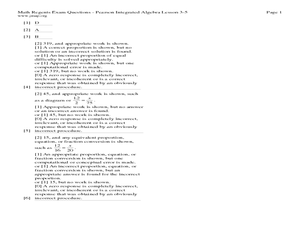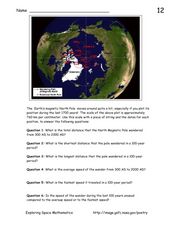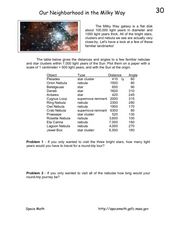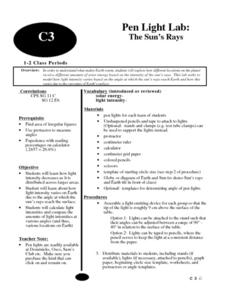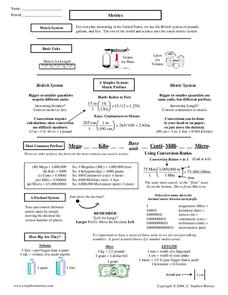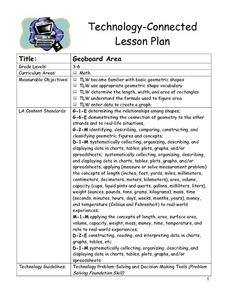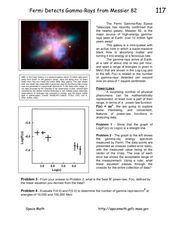Curated OER
Introduction to Area
In this area worksheet, students find the area of four rectangles when given the drawings with grid markings inside each. They use the area formula to find the area of five rectangles. This worksheet is intended to be used as a part of a...
Curated OER
Solar Electricity
In this solar electricity and satellites worksheet, students calculate the perimeter of a satellite, they find the area of the surface of the satellite and they determine if there is sufficient space for enough solar panels to supply the...
Curated OER
Lesson 3-5: Proportions and Similar Figures
In this similar figures activity, students use proportions to solve 6 short answer and multiple choice questions. Students use proportions to answer questions about map scales and height of trees given shadow lengths.
Curated OER
Changes in the Copper Penny
Third graders explore the difference between a physical change in a substance and a chemical change. students study the volume, density, altering shape and chemistry of a copper penny.
Curated OER
Hands On: Construct Triangles and Rectangles
In this congruent triangles and rectangles worksheet, students solve 6 word problems where they identify whether triangles and rectangles are congruent, and construct triangles. Students must explain their reasoning and prove each answer.
Curated OER
Models of Planets
In this planet models worksheet, students use the radius of a given planet and its mass to answer questions using a model of a planet with a given radius. They determine the volume of the planet's inner core, the volume of its outer...
Curated OER
Earth's Magnetic Pole
In this Earth's magnetic pole worksheet, students use a diagram showing the changes in the magnetic pole of the Earth over time. Students use the given scale of the changes to answer 6 questions about the average speed of the magnetic...
Curated OER
Our Neighborhood in the Milky Way
In this Milky Way galaxy worksheet, learners are given a table of distances and angles of nebulae and star clusters from the sun. Students plot each one on a piece of paper and solve 2 problems using the data.
Math Mammoth
Finding the Area of Rectangles, Parallelograms, and Triangles
In this area of polygons activity, 9th graders solve two area of rectangles, one area of parallelogram, and ten area of triangles problems. The formulas for finding the area of these figures are provided.
Curated OER
SAT Practice Test
For this online, interactive worksheet, students solve ten SAT preparation problems in 12 minutes. The problems vary in difficulty and content.
Curated OER
Making It Balance
Students listen to story, "The 100-Pound Problem," compare their weight with character in story, and weigh different classroom items using nonstandard units and standard units. They experiment with different items that can make scale...
Curated OER
Similarity and Congruence
Students determine that two figures are similar or congruent by
investigating figures that are similar and figures that are congruent. They prove that two figures are similar or congruent by using definitions,
postulates, and theorems.
Curated OER
Mapping The Ocean Floor
Young scholars explore and analyze the bottom structure of underwater habitats. They describe and explain what can't see through the collection and correlation of accurate data. Learners assess that technology is utilized as a tool for...
Curated OER
What Influences Reaction Rate?
Learners study reaction rates, what determines how fast a reaction happens and how the chemical changes occur. In this reactions lesson students complete a lab where they use Alka-Seltzer to observe reaction rate and create a graph with...
Curated OER
Pen Light Lab
Learners study what makes Earth warm and explore how different locations on the planetreceive different amounts of solar energy based on the intensity of the sun's rays. They calculate light intensities and compare the
amounts of light...
Curated OER
Basics of Science
In this basics of science worksheet, students review the metric system, the difference between homogenous and heterogenous mixtures, the scientific method, and science lab first aid. This worksheet has 15 short answer, 43 fill in the...
Curated OER
Metrics
In this metrics worksheet, students read information about the metric system. Students review the concepts of prefixes, conversion ratios, and the decimal system. This worksheet has 17 matching, 31 fill in the blank, and 8 word problems.
Curated OER
Huff, Puff, and Slide
In this experimental design worksheet, students use a cup and coins to determine the distance they can blow a cup with varying amounts of coins. They analyze their results and design an experiment using the same materials.
Curated OER
HW Unit 10:2-Harmonic Motion
In this harmonic motion worksheet, students answer 9 questions about pendulums, a slinky and characteristics of harmonic motion. They identify the changes in waves as the amplitude gets bigger and interpret a graph of position vs. time.
Curated OER
Hinode Studies Loopy Sunspots!
For this sunspots and magnetic fields worksheet, students read about the satellite images taken showing 'loopy' patterns from solar gases and the magnetic fields on the sun. Students solve 2 problems including finding the volume of a...
Curated OER
Geoboard Area
Students explore the basic geometric shapes and geometric shape vocabulary through the use of geoboards and virtual geoboards. They create a variety of shapes with a partner, build ten different rectangles on their geoboards, and...
Curated OER
Fermi Detects Gamma-Rays from Messier
In this power law function worksheet, learners use data from the Fermi Gamma-Ray Space telescope to apply the power law function to physical phenomena. Students use a graph to solve four problems.
Curated OER
Dig Into Soil
Young scholars discuss what is found in soil. In this science lesson plan, students observe the soil outside and write down information in regards to location, vegetation, and topography. Young scholars experiment with the soil and its...
Curated OER
I've Got That Sinking Feeling
Students design a simple boat and predict how much weight it can carry. They should also discover why objects float or sink and how this can be determined experimentally. A great lesson on buoyancy!




